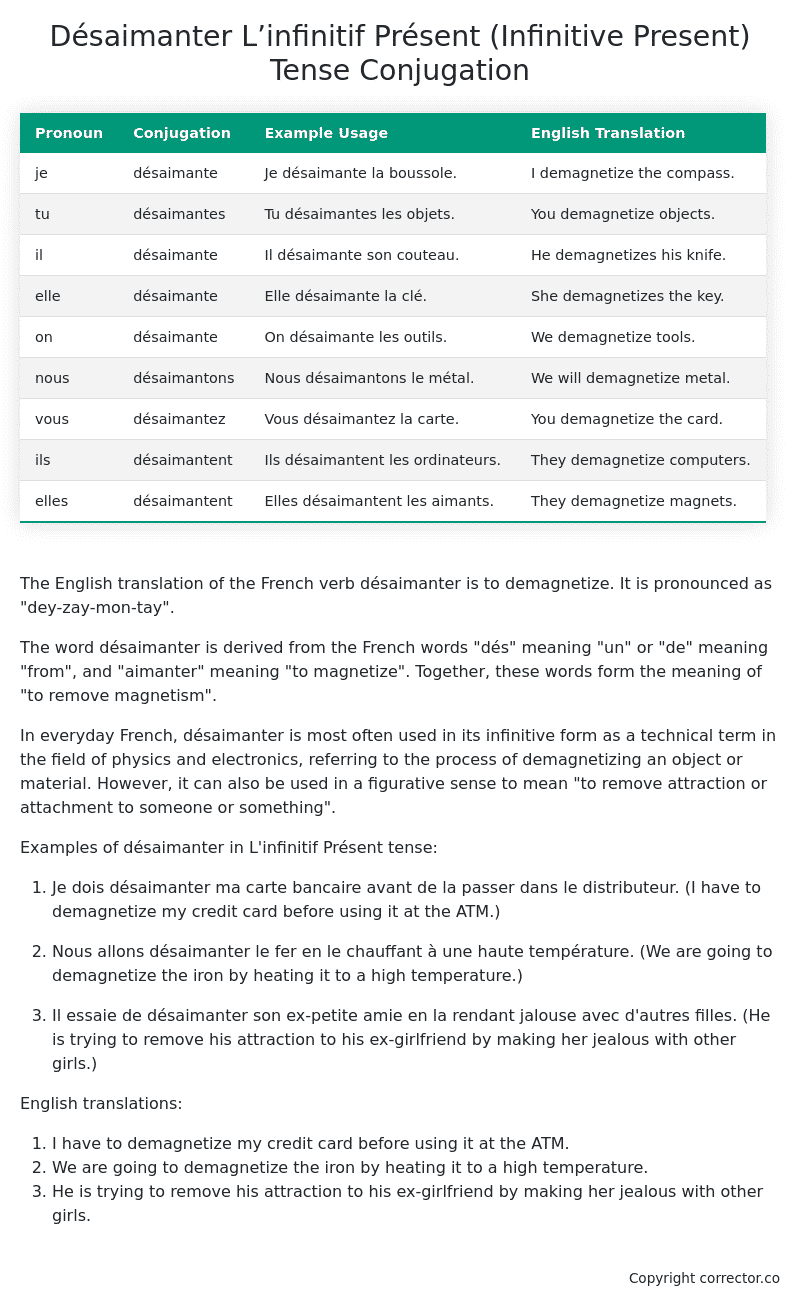L’infinitif Présent (Infinitive Present) Tense Conjugation of the French Verb désaimanter
Introduction to the verb désaimanter
The English translation of the French verb désaimanter is to demagnetize. It is pronounced as “dey-zay-mon-tay”.
The word désaimanter is derived from the French words “dés” meaning “un” or “de” meaning “from”, and “aimanter” meaning “to magnetize”. Together, these words form the meaning of “to remove magnetism”.
In everyday French, désaimanter is most often used in its infinitive form as a technical term in the field of physics and electronics, referring to the process of demagnetizing an object or material. However, it can also be used in a figurative sense to mean “to remove attraction or attachment to someone or something”.
Examples of désaimanter in L’infinitif Présent tense:
-
Je dois désaimanter ma carte bancaire avant de la passer dans le distributeur. (I have to demagnetize my credit card before using it at the ATM.)
-
Nous allons désaimanter le fer en le chauffant à une haute température. (We are going to demagnetize the iron by heating it to a high temperature.)
-
Il essaie de désaimanter son ex-petite amie en la rendant jalouse avec d’autres filles. (He is trying to remove his attraction to his ex-girlfriend by making her jealous with other girls.)
English translations:
- I have to demagnetize my credit card before using it at the ATM.
- We are going to demagnetize the iron by heating it to a high temperature.
- He is trying to remove his attraction to his ex-girlfriend by making her jealous with other girls.
Table of the L’infinitif Présent (Infinitive Present) Tense Conjugation of désaimanter
| Pronoun | Conjugation | Example Usage | English Translation |
|---|---|---|---|
| je | désaimante | Je désaimante la boussole. | I demagnetize the compass. |
| tu | désaimantes | Tu désaimantes les objets. | You demagnetize objects. |
| il | désaimante | Il désaimante son couteau. | He demagnetizes his knife. |
| elle | désaimante | Elle désaimante la clé. | She demagnetizes the key. |
| on | désaimante | On désaimante les outils. | We demagnetize tools. |
| nous | désaimantons | Nous désaimantons le métal. | We will demagnetize metal. |
| vous | désaimantez | Vous désaimantez la carte. | You demagnetize the card. |
| ils | désaimantent | Ils désaimantent les ordinateurs. | They demagnetize computers. |
| elles | désaimantent | Elles désaimantent les aimants. | They demagnetize magnets. |
Other Conjugations for Désaimanter.
Le Present (Present Tense) Conjugation of the French Verb désaimanter
Imparfait (Imperfect) Tense Conjugation of the French Verb désaimanter
Passé Simple (Simple Past) Tense Conjugation of the French Verb désaimanter
Passé Composé (Present Perfect) Tense Conjugation of the French Verb désaimanter
Futur Simple (Simple Future) Tense Conjugation of the French Verb désaimanter
Futur Proche (Near Future) Tense Conjugation of the French Verb désaimanter
Plus-que-parfait (Pluperfect) Tense Conjugation of the French Verb désaimanter
Passé Antérieur (Past Anterior) Tense Conjugation of the French Verb désaimanter
Futur Antérieur (Future Anterior) Tense Conjugation of the French Verb désaimanter
Subjonctif Présent (Subjunctive Present) Tense Conjugation of the French Verb désaimanter
Subjonctif Passé (Subjunctive Past) Tense Conjugation of the French Verb désaimanter
Subjonctif Imparfait (Subjunctive Imperfect) Tense Conjugation of the French Verb désaimanter
Conditionnel Présent (Conditional Present) Tense Conjugation of the French Verb désaimanter
Conditionnel Passé (Conditional Past) Tense Conjugation of the French Verb désaimanter
L’impératif Présent (Imperative Present) Tense Conjugation of the French Verb désaimanter
L’infinitif Présent (Infinitive Present) Tense Conjugation of the French Verb désaimanter (this article)
Struggling with French verbs or the language in general? Why not use our free French Grammar Checker – no registration required!
Get a FREE Download Study Sheet of this Conjugation 🔥
Simply right click the image below, click “save image” and get your free reference for the désaimanter L’infinitif Présent tense conjugation!

Désaimanter – About the French L’infinitif Présent (Infinitive Present) Tense
Forming the Infinitive Present
Common Everyday Usage Patterns
As a Verb’s Dictionary Form
After Modal Verbs
As an Imperative
In Infinitive Clauses
Interactions with Other Tenses
Present Tense
Future Tense
Conditional Tense
Passé Composé
Imperfect Tense
Subjunctive and Conditional Moods
Summary
Want More?
I hope you enjoyed this article on the verb désaimanter. Still in a learning mood? Check out another TOTALLY random French verb conjugation!


